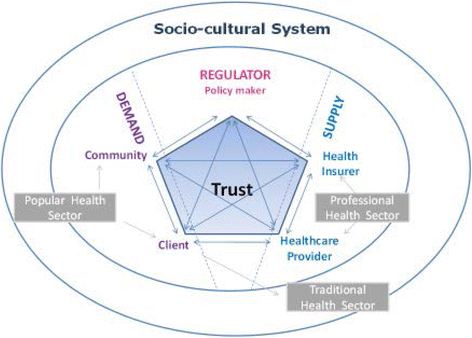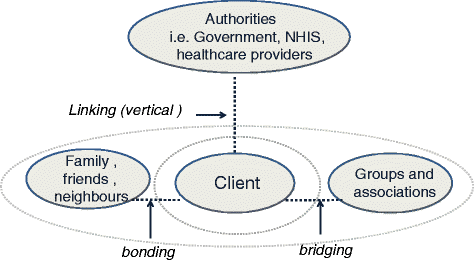Social capital and active membership in the Ghana National Health Insurance Scheme - a mixed method study
- PMID: 26526063
- PMCID: PMC4630914
- DOI: 10.1186/s12939-015-0239-y
Social capital and active membership in the Ghana National Health Insurance Scheme - a mixed method study
Abstract
Background: People's decision to enroll in a health insurance scheme is determined by socio-cultural and socio-economic factors. On request of the National health Insurance Authority (NHIA) in Ghana, our study explores the influence of social relationships on people's perceptions, behavior and decision making to enroll in the National Health Insurance Scheme. This social scheme, initiated in 2003, aims to realize accessible quality healthcare services for the entire population of Ghana. We look at relationships of trust and reciprocity between individuals in the communities (so called horizontal social capital) and between individuals and formal health institutions (called vertical social capital) in order to determine whether these two forms of social capital inhibit or facilitate enrolment of clients in the scheme. Results can support the NHIA in exploiting social capital to reach their objective and strengthen their policy and practice.
Method: We conducted 20 individual- and seven key-informant interviews, 22 focus group discussions, two stakeholder meetings and a household survey, using a random sample of 1903 households from the catchment area of 64 primary healthcare facilities. The study took place in Greater Accra Region and Western Regions in Ghana between June 2011 and March 2012.
Results: While social developments and increased heterogeneity seem to reduce community solidarity in Ghana, social networks remain common in Ghana and are valued for their multiple benefits (i.e. reciprocal trust and support, information sharing, motivation, risk sharing). Trusting relations with healthcare and insurance providers are, according healthcare clients, based on providers' clear communication, attitude, devotion, encouragement and reliability of services. Active membership of the NHIS is positive associated with community trust, trust in healthcare providers and trust in the NHIS (p-values are .009, .000 and .000 respectively).
Conclusion: Social capital can motivate clients to enroll in health insurance. Fostering social capital through improving information provision to communities and engaging community groups in health care and NHIS services can facilitate peoples' trust in these institutions and their active participation in the scheme.
Figures



References
-
- Alesina A, Ferrara EL. Who trusts others? J Public Econ. 2002;85(2):207–234. doi: 10.1016/S0047-2727(01)00084-6. - DOI
-
- Arhinful D. The solidarity of self-interest. Research report. Leiden: African Studies Centre; 2003.
-
- Aryeetey GC, Jehu-Appiah C, Spaan E, Agyepong I, Baltussen R. Cost, equity, efficiency and feasibility of identifying the poor in Ghana’s National Health Insurance Scheme: empirical analysis of various strategies. Trop Med Int Health. 2011;17(1):43–51. doi: 10.1111/j.1365-3156.2011.02886.x. - DOI - PubMed
-
- Bourdieu P. The forms of capital. In: Richardson JG, editor. Handbook of theory and research for the sociology of education. New York: Greenwood; 1986.
Publication types
MeSH terms
LinkOut - more resources
Full Text Sources
Other Literature Sources

